Did Muslim Voters Swing the 2024 Election for Trump?
The only comprehensive poll of Muslim-American voters since November 2024, shared first with Zeteo, shows these voters are more divided – and more complex – than most post-election narratives suggest.
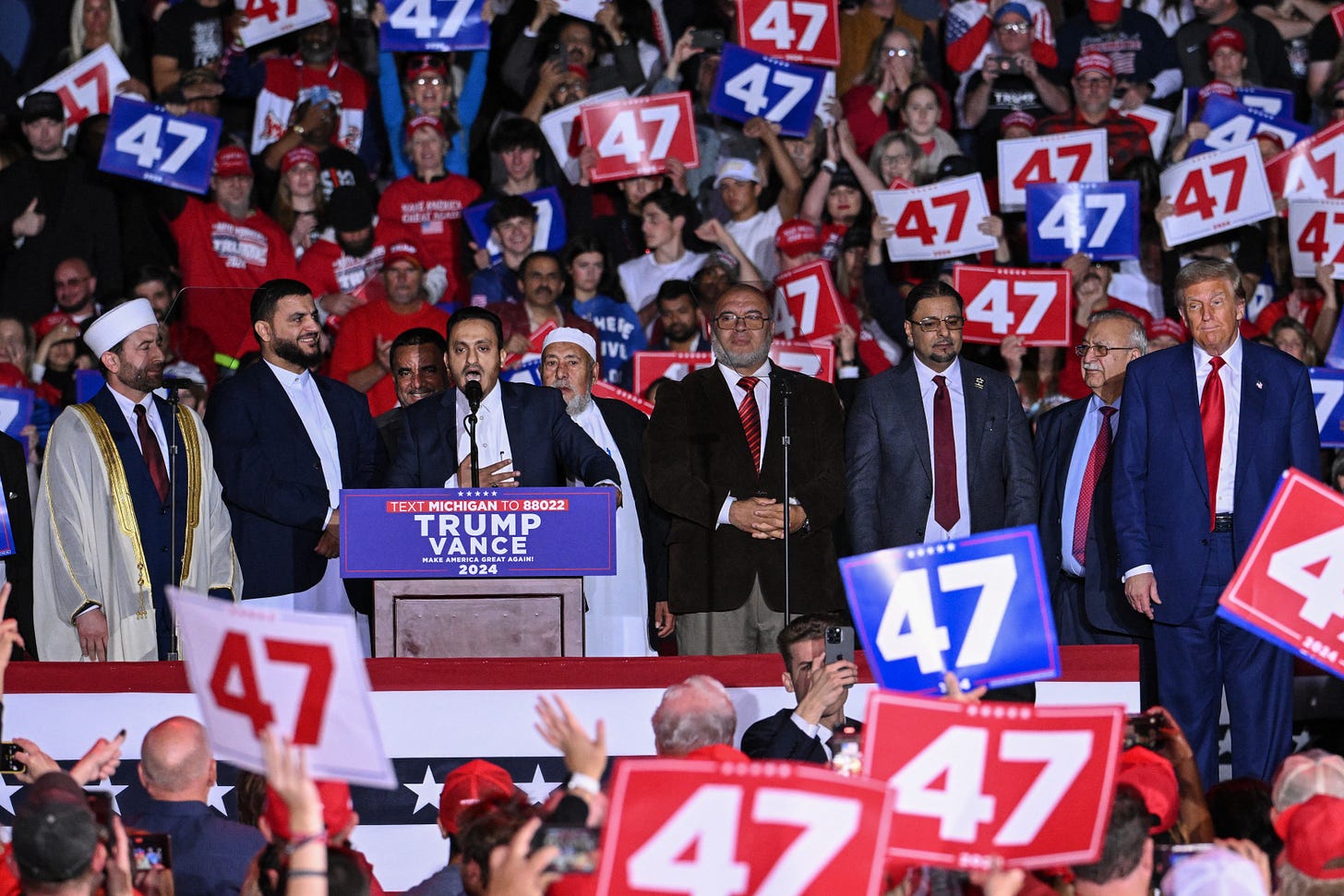
Did Muslim voters swing the election for Donald Trump in November 2024? And what does their vote say about the future of American Muslim political engagement?
These questions have taken a front seat in op-ed pages and news stories over the past several months of the election post-mortem. A new survey of American Muslim voters released today by the Institute for Social Policy and Understanding (ISPU), the first comprehensive poll of Muslim voters since November 2024, reveals surprising new findings and dispels widely circulated but unsubstantiated arguments about the current state of Muslim voters and their policy priorities. Our data shows Muslim voters are more divided – and more complex – than most post-election narratives suggest.
The 2024 presidential election was marked by headlines of Muslim and Arab activists trying to pressure then-Democratic nominee Joe Biden and later Kamala Harris to shift what many considered a disastrous policy on Gaza. From “uncommitted” vote campaigns to protests, ultimately, their attempts fell on deaf ears across the establishment, from the White House to the Democratic Convention.
While the Democratic Party refused to platform elected Muslim and Palestinian policymakers within their own party, Trump went to Michigan to campaign in the city with the largest Muslim population per capita in the United States, inviting local Muslim leaders onstage with him. The effort appeared to yield the intended result – for the first time since the election of George W. Bush, the majority of votes in Dearborn went to the Republican presidential candidate in 2024.
So did Trump’s courting of Muslim voters in Michigan and his promises to secure “peace in the Middle East” translate on a nationwide scale? Perhaps not as comprehensively as some would think.
ISPU’s new survey shows that the sense of betrayal at the Democratic Party’s inflexibility, combined with strategic appeals from both the Republican Party and third-party candidates did drive previous Biden Muslim voters away from Harris, with 45% of those who voted for Biden in 2020 shifting their vote or skipping voting for president altogether. However, the narrative that Muslims cost Harris the election and helped put Trump into office belies the findings of our survey that show 50% of Muslims voted for Harris, 31% voted for Trump, and only 12% voted for a third-party candidate. Moreover, 2024 Muslim Trump voters are also repeat Trump voters. In fact, 82% of American Muslims who said they voted for Trump in 2020, claimed they voted for him again in 2024. The survey also shows that 58% of Muslims identify as Democrats, 17% as Republicans, and 24% as Independents, revealing that Muslim votes can be won over.
So who are those Muslim Trump voters? ISPU’s poll offers some insight.
Our data indicates Muslims who voted for Trump tend to identify as or lean Republican, have a household income above $75,000, are born in the US, self-identify as white, and express Islamophobic sentiments, including higher support for five false negative stereotypes we test about Muslims in the US, including that Muslims are more prone to violence than other people, or are partially responsible for acts of violence carried out by other Muslims.
Muslim Trump voters are also mostly men, with 42% of Muslim men saying they voted for Trump compared to 17% of Muslim women. In fact, Muslim men overall – Trump voters or not – are more likely to support every single one of Trump’s policies we tested in our survey, including support for the so-called Department of Government Efficiency (DOGE), the expansion of ICE, the termination of DEI mandates, broad tariffs, and more.
One thing is certain: Gaza resonates the most with Muslim voters across all parties and candidates. Muslim Trump and Harris voters both included the economy and the war in Gaza in their top three policy priorities, differing on the third one. For Muslim Harris voters, healthcare ranked slightly above the war in Gaza, whereas for Muslim Trump voters, the economy ranked higher than the war on Gaza. The 12% of Muslims who voted for third-party candidates indicated the war in Gaza as their top policy priority.
So can Muslim voters be reliably Republican or Democrat? The data over the past two decades shows that Muslims have swung left and right based on the issues – some that are similar to the general public, such as the economy and healthcare, and some that are unique, such as foreign policy.
Looking back at the pre-9/11 period, the majority of Muslims voted for a Republican candidate. But soon after Muslims coalesced for George W. Bush, the post-9/11 invasion of Afghanistan and Iraq, and the establishment of anti-Muslim policies such as the Patriot Act and NSEERS, pushed many Muslims to leave the Republican Party.
Yet some remained. While African American Muslims are less likely to support Republican candidates due in part to their differential experiences and the history of racism, white Muslims have different experiences. ISPU’s survey allows participants to identify racially and ethnically as white or Arab, among other racial categories. According to ISPU’s research, these white Muslims include a minority of converts, but also those who are Iranian, Turkish, Armenian, and others hailing from other Eastern European countries. In addition to groups like “Muslims for Trump,” there was also an effort by Iranian Americans to garner support for Trump ahead of the election because they felt the Biden and Harris administration did not do enough to confront the Iranian government, one they fled due to the Islamic Revolution.
Most importantly, our survey reinforces an argument that many in the Muslim community have tried to emphasize: American Muslims are not a monolith. ISPU’s poll shows that one-third of them voted for Trump. And these are not all new voters or ones that went to Trump solely because of Biden’s response to the genocide in Gaza. ISPU’s poll showed that for American Muslims who voted for Biden in 2020, 55% voted for Harris, 10% voted for Trump, 16% voted for a third-party candidate, and 19% did not vote for the president. It appears that it is Muslim Democratic voters who are not sticking with the Democratic Party, but they did not overwhelmingly vote for Trump. The majority of those who left voted third-party or did not vote for president.
With the Trump administration’s successful negotiation of a ceasefire agreement between Israel and Hamas this month, some Muslim Trump voters may feel vindicated by their choice. While it’s too soon to tell if the ceasefire will hold, and what the aftermath of a Gaza in ruins will be, Trump’s wild remarks and postings of AI-generated videos depicting Gaza as a beachfront riviera back in February angered even some of his most ardent Muslim and Arab supporters.
Ultimately, Muslim votes are up for grabs as the ISPU survey shows. They are no different from other voters in their desire to convince politicians to support causes they feel strongly about and to address challenges they face in their daily lives, such as economic and healthcare concerns. Ahead of elections in November this year and next, including several where Muslim voters are concentrated and influential, understanding the Muslim voter is key for candidates who want to win them over. Ignoring them isn’t just bad politics; it’s a missed opportunity to understand America’s evolving electorate.
Saher Selod is the director of research at the Institute for Social Policy and Understanding (ISPU) and the co-author of American Muslim Poll 2025: Evolving Electorate, Enduring Challenges. Tuqa Nusairat is the executive director at ISPU.
The views expressed in this article are the author’s own and do not necessarily reflect those of Zeteo.
Check out more from Zeteo:




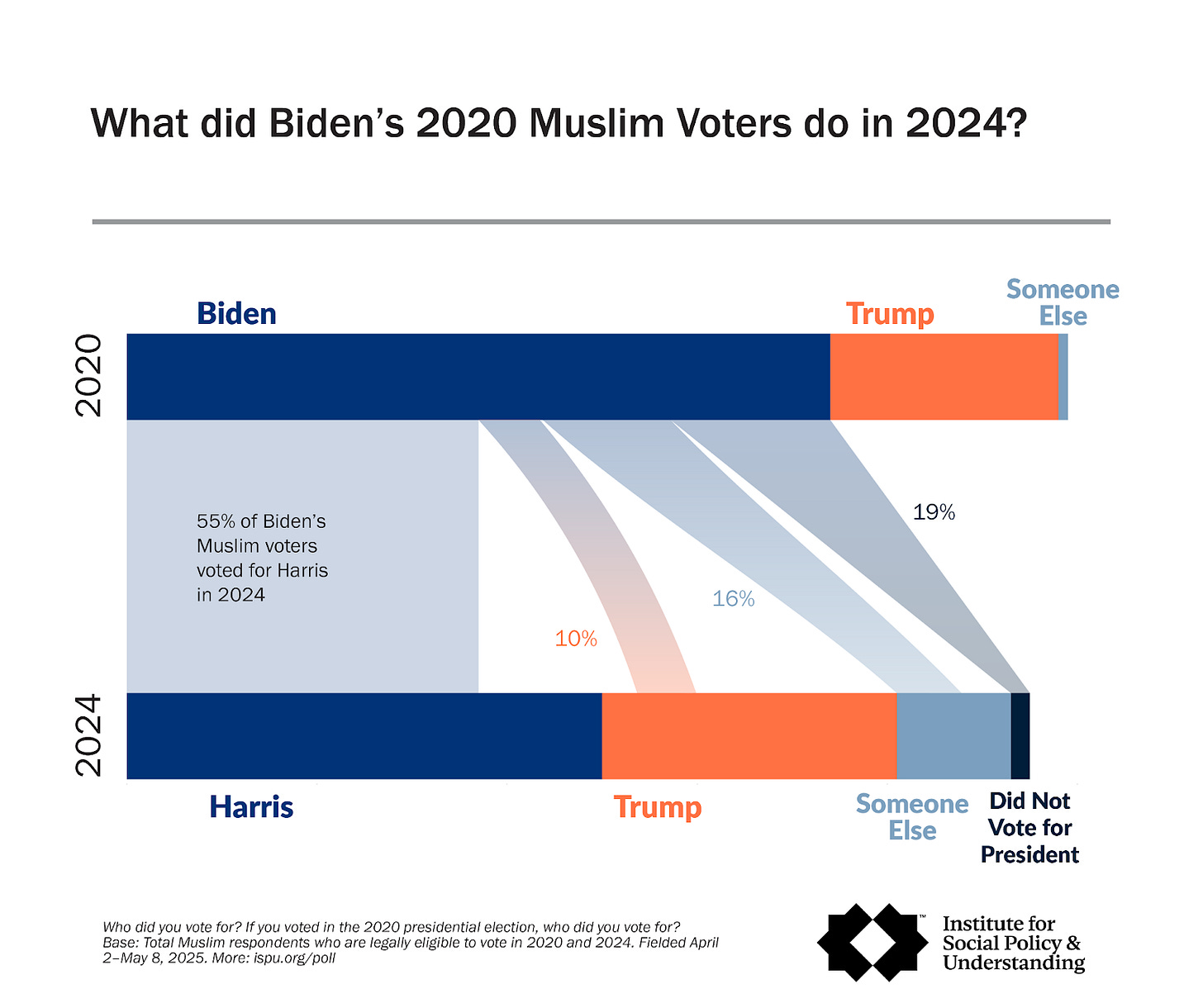
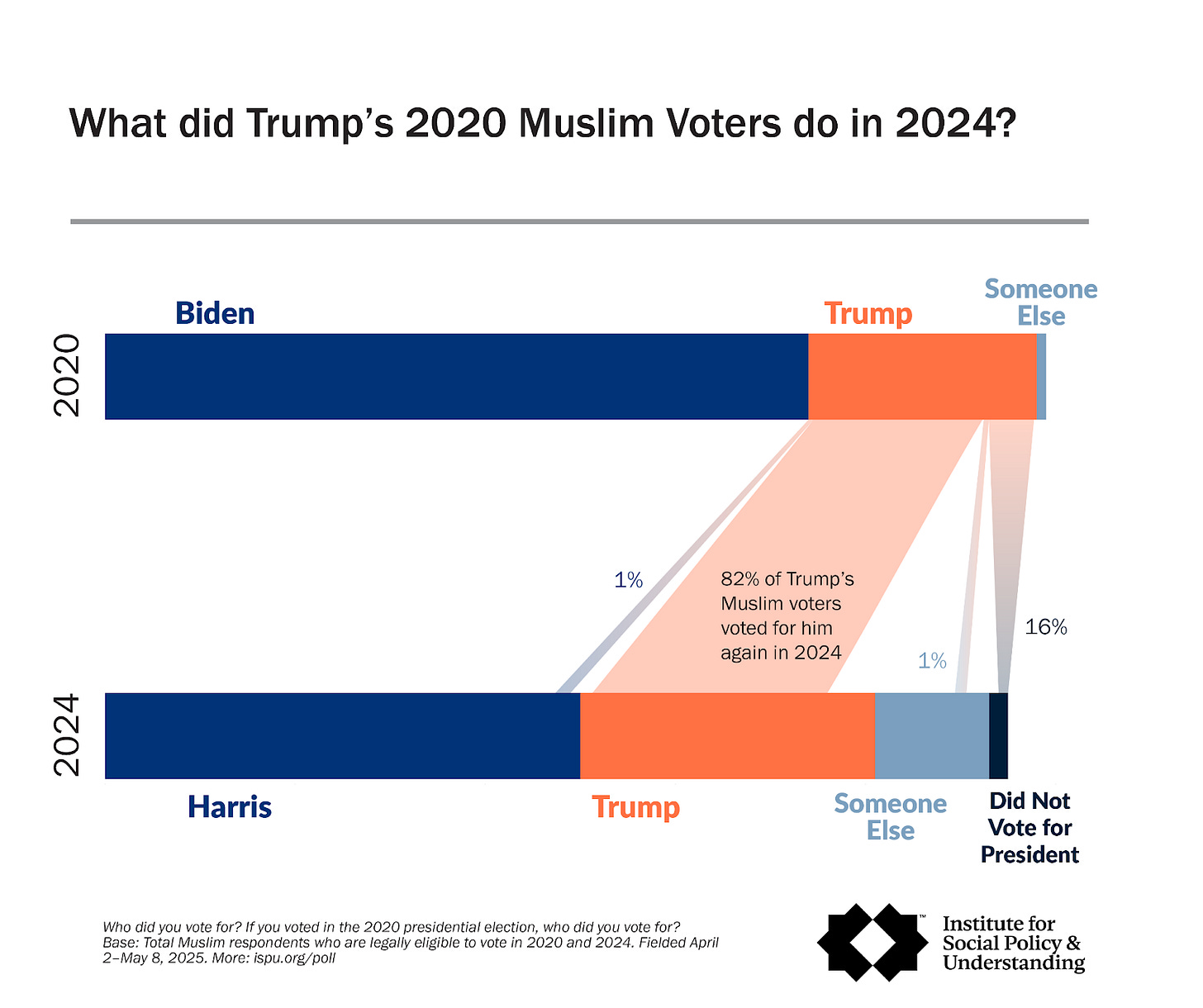
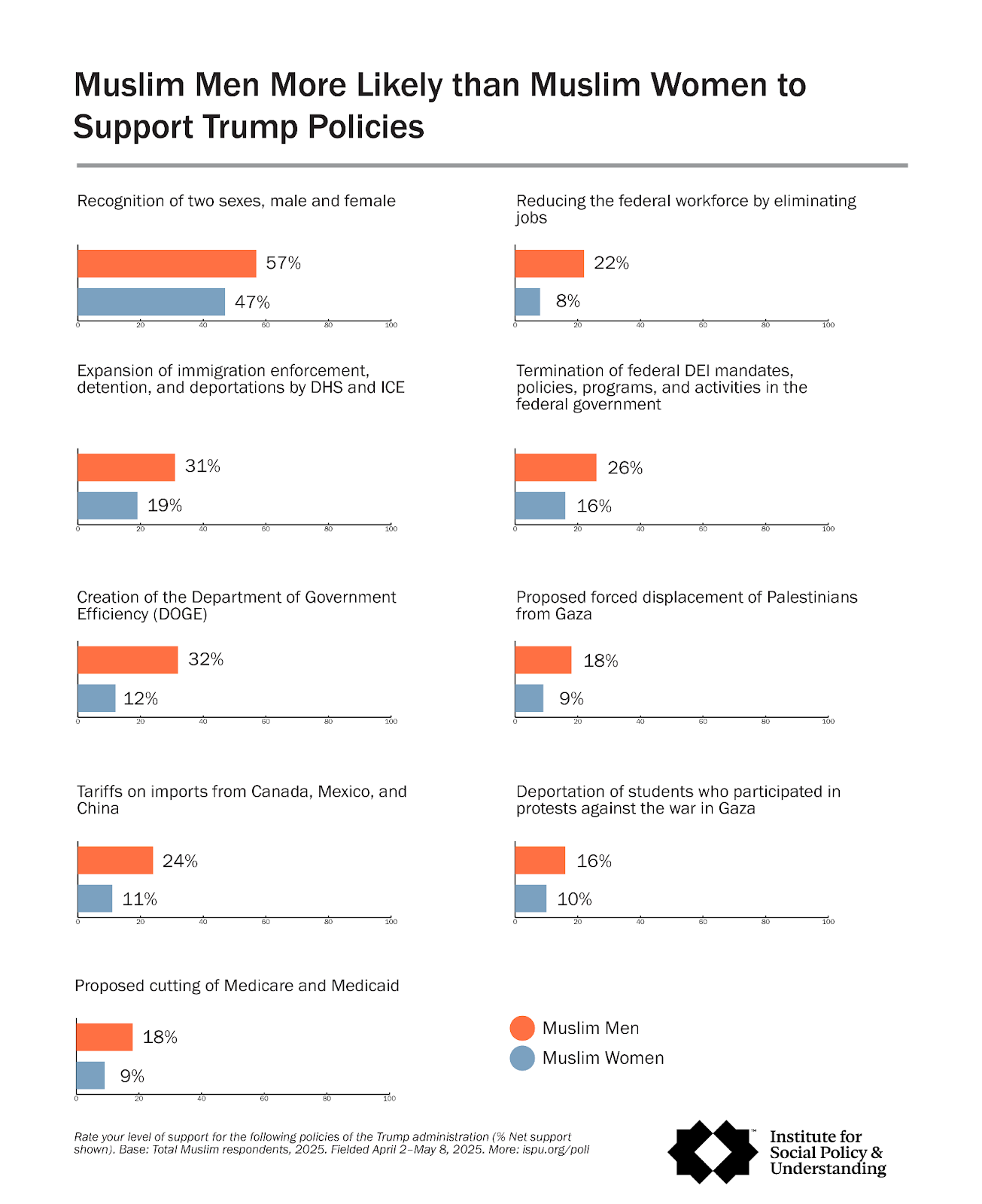
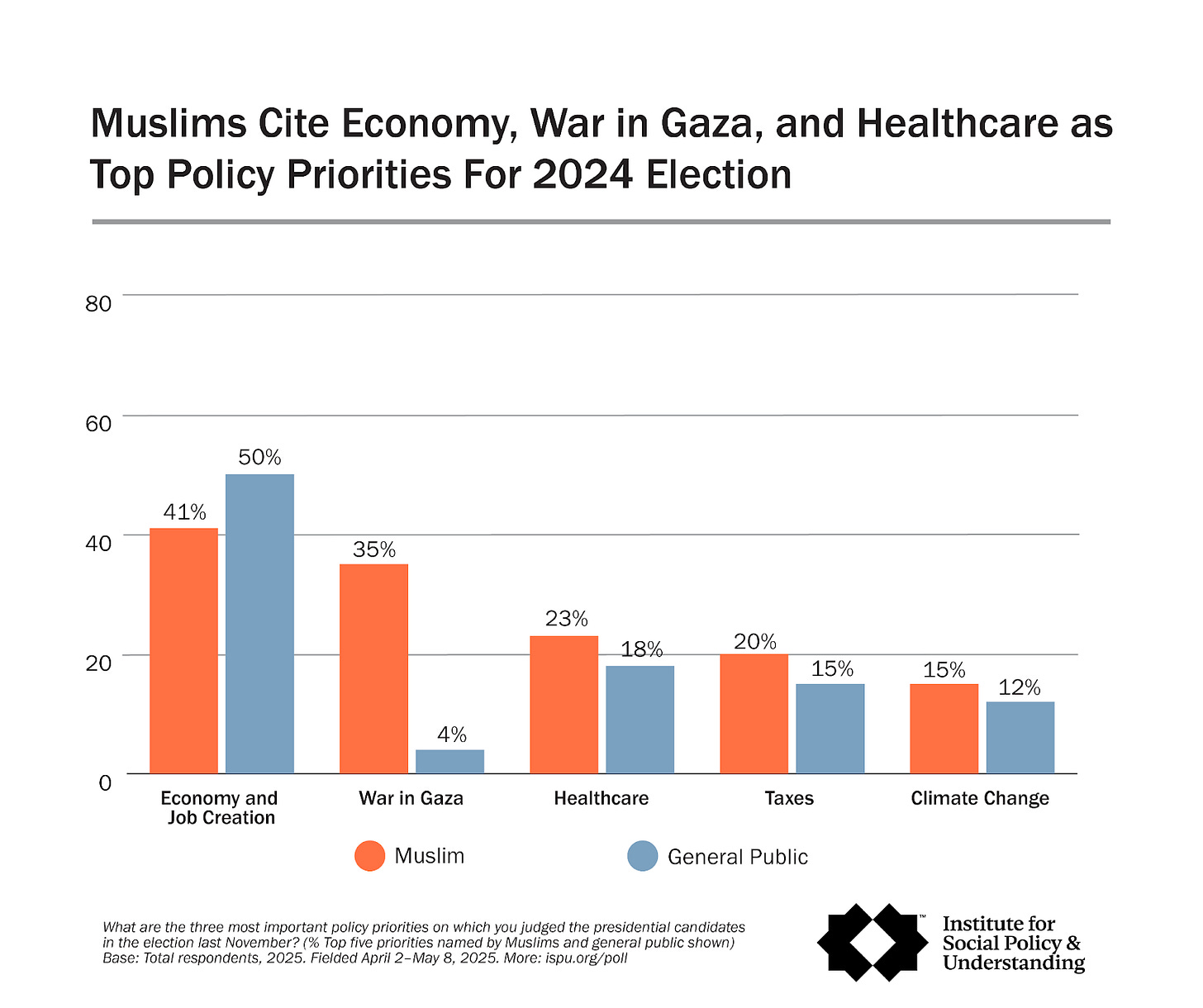
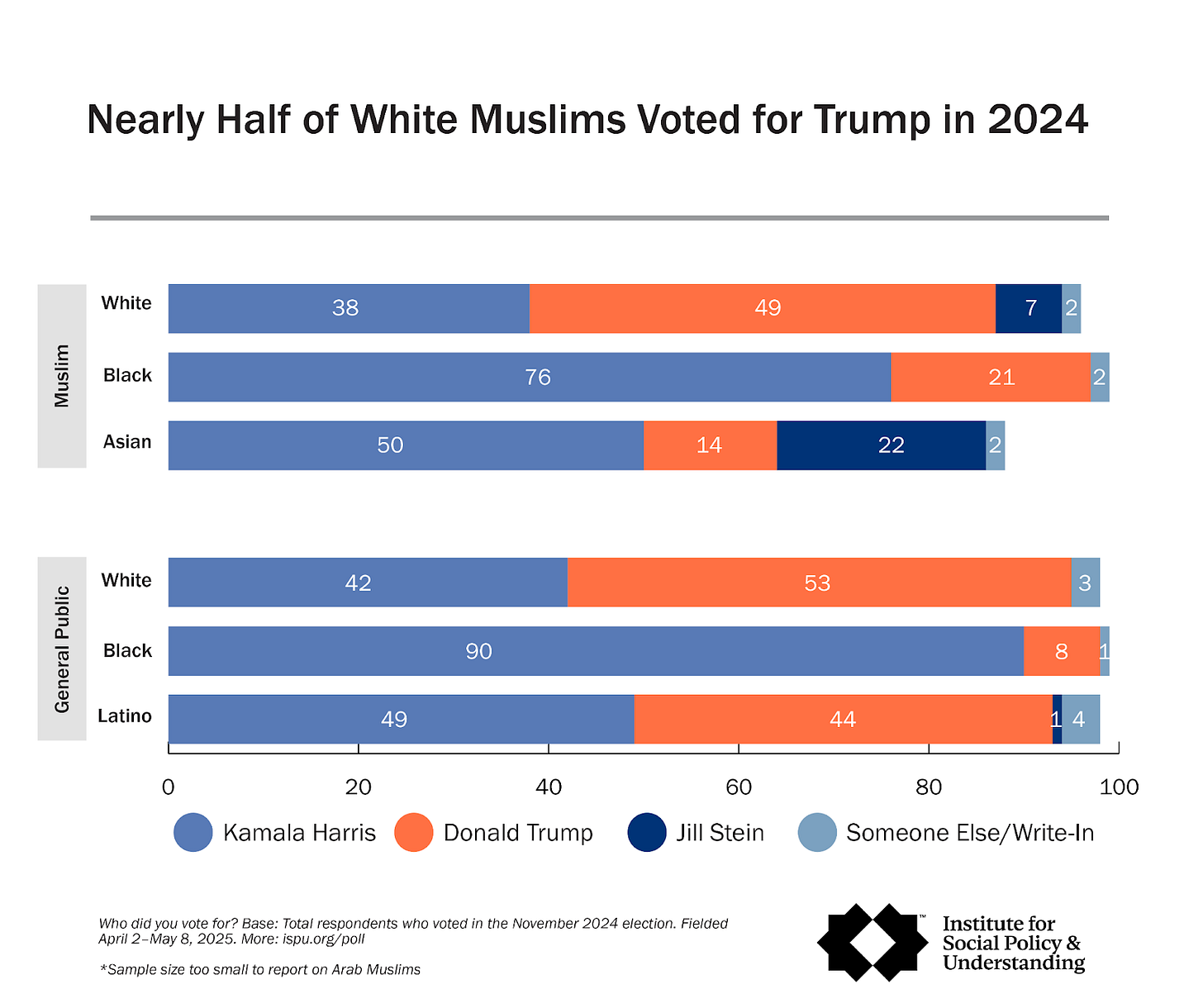
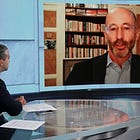
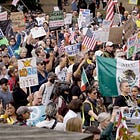
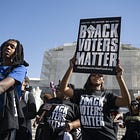
Reading the stats on the 2024 election
gives me a migraine.
I will never understand one issue voters or anyone who believed 🍊 A$$ after Jan. 6th.
Anyone—*anyone*—who didn’t vote for Biden [Harris, I meant: talk about a block! But I think people got my drift.] in a swing state in 2024 is a fucking asshole. Full stop.